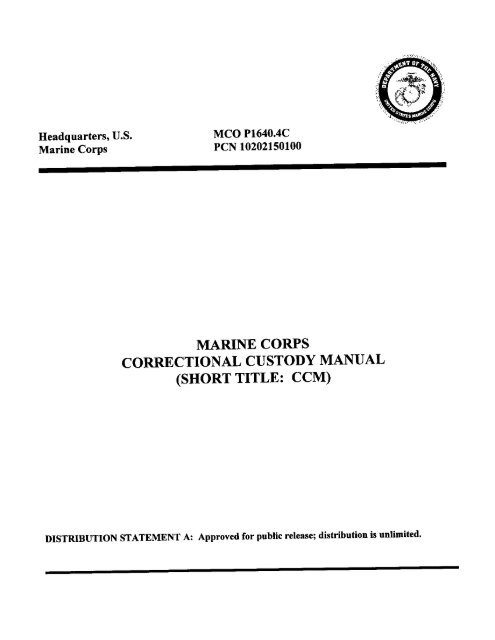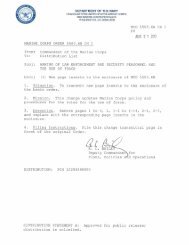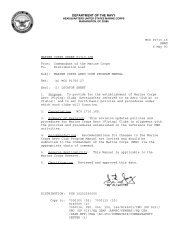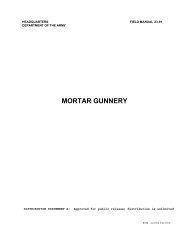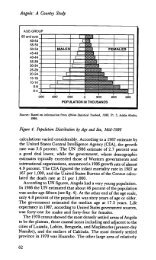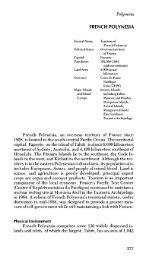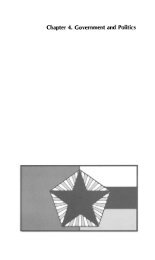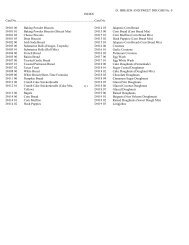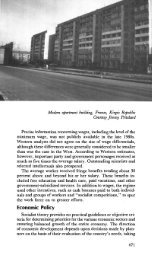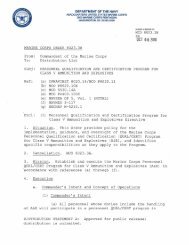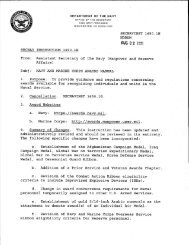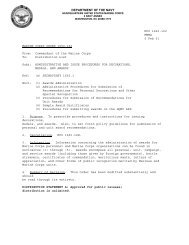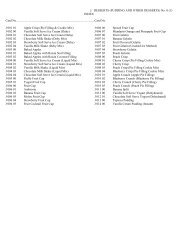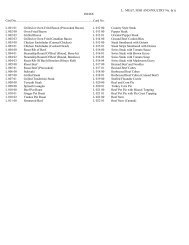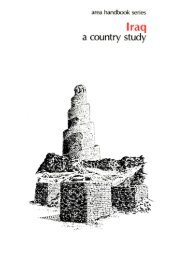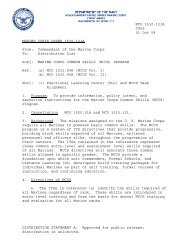MCO P1640.4C.pdf - Marine Corps
MCO P1640.4C.pdf - Marine Corps
MCO P1640.4C.pdf - Marine Corps
Create successful ePaper yourself
Turn your PDF publications into a flip-book with our unique Google optimized e-Paper software.
MARINE CORPS ORDER <strong>P1640.4C</strong><br />
From: Commandant of the <strong>Marine</strong> <strong>Corps</strong><br />
To: Distribution List<br />
Subj: MARINE CORPS CORRECTIONAL CUSTODY MANUAL<br />
(SHORT TITLE: CCM)<br />
<strong>MCO</strong> <strong>P1640.4C</strong><br />
POS-40<br />
9 Mar 99<br />
Ref: (a) Manual for Courts-Martial, United States (1995 edition)<br />
(b) SECNAVINST 1640.7D<br />
(c) SECNAVINST 1640.9B<br />
(d) <strong>MCO</strong> P5600.31G<br />
Encl: (1) LOCATOR SHEET<br />
1. Purpose. To publish basic policies, standards, and procedures for the<br />
operation of <strong>Marine</strong> <strong>Corps</strong> Correctional Custody Units (CCU’S).<br />
2. Cancellation. <strong>MCO</strong> P1640.4B<br />
DEPARTMENT OF THE NAVY<br />
HEADQUARTERS UNITED STATES MARINE CORPS<br />
2 NAVY ANNEX<br />
WASHINGTON, DC 20380-1775<br />
3. Information. Reference (a) delineates the policies governing<br />
nonjudicial punishment and the actions that can be taken under<br />
Article 15, UCMJ. Correctional custody (CC) and other punishments<br />
authorized under Article 15,UCMJ are corrective in nature and are<br />
designed to provide commanding officers and officers in charge with a<br />
means of disposing minor infractions of discipline without having to<br />
resort to the court-martial system. Reference(b) outlines the<br />
Secretary of the Navy policy in regard to CC as a punishment awarded<br />
under reference (a).<br />
4. Action. Commanders operating CCU’s shall ensure that CC procedures<br />
are in effect within their jurisdictions and comply with references (a),<br />
(b), (c), and this Manual.<br />
5. Reserve Applicability. This Manual is not applicable to the<br />
<strong>Marine</strong> <strong>Corps</strong> Reserve.<br />
DISTRIBUTION STATEMENT A: Approved for public release; distribution<br />
is unlimited.
<strong>MCO</strong> <strong>P1640.4C</strong><br />
9 Mar 99<br />
6. Certification. Reviewed and approved this date.<br />
{li 16404c02.gif:Signature}<br />
DISTRIBUTION: PCN 10202150100<br />
Copy to: 7000110 (100)<br />
7000023 (75)<br />
7000093/8145005 (2)<br />
7000099, 144/8145001 (1)<br />
2
LOCATOR SHEET<br />
Subj: <strong>Marine</strong> <strong>Corps</strong> Correctional Custody Manual<br />
Location: _____________________________________________________<br />
(Indicate the location(s) of the copy(ies) of this<br />
Manual.)<br />
<strong>MCO</strong> <strong>P1640.4C</strong><br />
9 Mar 99<br />
ENCLOSURE (1)
Log completed change action as indicated.<br />
MARINE CORPS CORRECTIONAL CUSTODY MANUAL<br />
RECORD OF CHANGES<br />
____________________________________________________________________<br />
Change | Date of | Date | Date | Signature of Person<br />
Number | Change | Received | Entered | Entering Change<br />
_______|_________|__________|_________|_________________________<br />
| | | |<br />
_______|_________|__________|_________|_________________________<br />
| | | |<br />
_______|_________|__________|_________|_________________________<br />
| | | |<br />
_______|_________|__________|_________|_________________________<br />
| | | |<br />
_______|_________|__________|_________|_________________________<br />
| | | |<br />
_______|_________|__________|_________|_________________________<br />
| | | |<br />
_______|_________|__________|_________|_________________________<br />
| | | |<br />
_______|_________|__________|_________|_________________________<br />
| | | |<br />
_______|_________|__________|_________|_________________________<br />
| | | |<br />
_______|_________|__________|_________|_________________________<br />
| | | |<br />
_______|_________|__________|_________|_________________________<br />
i
CHAPTER<br />
1 GENERAL POLICY<br />
MARINE CORPS CORRECTIONAL CUSTODY MANUAL<br />
CONTENTS<br />
2 PHYSICAL PLANT AND MAJOR EQUIPMENT<br />
3 ORGANIZATION AND STAFF RELATIONS<br />
4 SECURITY<br />
5 CORRECTIONAL CUSTODY PROGRAM<br />
6 ADMINISTRATION<br />
7 SENTENCE COMPUTATION<br />
iii
MARINE CORPS CORRECTIONAL CUSTODY MANUAL<br />
CHAPTER 1<br />
GENERAL POLICY<br />
PARAGRAPH PAGE<br />
POLICY 1001 1-3<br />
AUTHORITY 1002 1-3<br />
SCOPE 1003 1-3<br />
CORRECTIONAL CUSTODY PHILOSOPHY 1004 1-3<br />
1-1
MARINE CORPS CORRECTIONAL CUSTODY MANUAL<br />
CHAPTER 1<br />
GENERAL POLICY<br />
1001. POLICY. Correctional custody is the physical restraint of<br />
a person during duty or non-duty hours, or both, imposed (hence, an<br />
awardee) as a punishment under Article 15, and may include extra<br />
duties, fatigue duties, or hard labor and an incident of<br />
correctional custody. The Secretary of the Navy has prescribed<br />
that correctional custody (CC) will be served in a centralized,<br />
ashore correctional custody unit (CCU), and that the program will<br />
provide effective guidance and assistance to offenders in<br />
discovering and correcting the cause of their misconduct. CCU’s<br />
shall accept both male and female awardees; however, females<br />
will be accepted at CCU’s only if females are assigned to the staff.<br />
1002. AUTHORITY. The basic authority to impose the punishment of<br />
CC is contained in Uniform Code of Military Justice (UCMJ), Article<br />
15, and Part V of reference (a), which authorizes commanding<br />
officers and officers in charge to impose CC on all but<br />
commissioned and warrant officers for not more than 7 consecutive<br />
days or, if imposed by an officer in the grade of O-4 or above, for<br />
not more than 30 consecutive days. Section 0111b of the Manual of<br />
the Judge Advocate General limits the imposition of correctional<br />
custody to E-3’s and below.<br />
1003. SCOPE. This Manual contains instructions which govern the<br />
administration and function of <strong>Marine</strong> <strong>Corps</strong> CCU’s. It does not<br />
take the place of directives set forth by higher authority, but<br />
rather amplifies and interprets those directives.<br />
1004. CORRECTIONAL CUSTODY PHILOSOPHY<br />
1. CC is the most serious deprivation of liberty authorized as a<br />
punishment under the UCMJ, Article 15. Article 15 is designed to<br />
be a means of disposing of minor infractions of discipline without<br />
having to stigmatize the offender with a court-martial conviction.<br />
2. CC in the <strong>Marine</strong> <strong>Corps</strong> will attempt to correct the negative<br />
attitudes and motivations of junior enlisted personnel through a<br />
regimen of hard work, intensive counseling, and physical training<br />
conducted in a strict, military environment. It is designed to<br />
have the greatest positive impact on the first-term <strong>Marine</strong> who has<br />
not yet fully developed self-discipline, a sense of responsibility,<br />
1-3
1004 MARINE CORPS CORRECTIONAL CUSTODY MANUAL<br />
and an understanding of the <strong>Marine</strong> <strong>Corps</strong>’ fundamental standards of<br />
acceptable behavior. CC is specifically designed for <strong>Marine</strong>s<br />
returning to duty and will not be used for personnel<br />
who are pending administrative separation.<br />
1-4
MARINE CORPS CORRECTIONAL CUSTODY MANUAL<br />
CHAPTER 2<br />
PHYSICAL PLANT AND MAJOR EQUIPMENT<br />
PARAGRAPH PAGE<br />
DESIGNATION 2001 2-3<br />
CONSTRUCTION AND ALTERATION 2002 2-3<br />
ALTERATIONS 2003 2-4<br />
2-1
MARINE CORPS CORRECTIONAL CUSTODY MANUAL<br />
CHAPTER 2<br />
PHYSICAL PLANT AND MAJOR EQUIPMENT<br />
2001. DESIGNATION. The CMC (POS-40) designates and authorizes the<br />
establishment and disestablishment of CCU’s.<br />
2002. CONSTRUCTION AND ALTERATION<br />
1. Functional adequacy and the accompanying authority to use a<br />
facility for CC is dependent upon an on-site evaluation of the<br />
facility for configuration, space utilization, and design by the<br />
CMC (POS-40).<br />
2. CC spaces shall have adequate lighting, heating, and<br />
ventilation. They must meet the standards prescribed by the<br />
Surgeon General of the Navy and the Navy Facility Design Manual<br />
for unaccompanied enlisted personnel housing.<br />
3. Berthing shall be in an open squadbay where possible. Separate<br />
male and female berthing areas (to include separate heads and<br />
shower facilities for males and females when applicable) shall<br />
allow for a minimum of 72 square feet of space for each awardee,<br />
excluding head and shower areas. Each dormitory shall have a<br />
drinking fountain and its own head facilities with adequate<br />
toilets, wash basins, and showers for the personnel assigned. Each<br />
awardee shall be assigned a bed and a locker for storage of<br />
personal effects. Lockers shall be secured with a combination or<br />
key-type lock provided by the awardee.<br />
4. Each CCU will have access to a multipurpose room equipped with<br />
tables and chairs which can be used for classroom lectures, study,<br />
visits, and other group functions.<br />
5. There shall be adequate office space for the officer in charge<br />
(OIC), staff noncommissioned officer in charge (SNCOIC), counselor,<br />
and administrative personnel.<br />
6. All facilities will have emergency exits in case of fire or<br />
other disaster. Fire doors will not be locked but may be alarmed<br />
so as to notify staff and awardees in the event of an emergency.<br />
2-3
2003 MARINE CORPS CORRECTIONAL CUSTODY MANUAL<br />
Adequate fire extinguishers, smoke alarms, and any other equipment<br />
prescribed by the local fire and safety codes will be installed.<br />
7. All units will have telephones for communications.<br />
2003. ALTERATIONS. Request for alterations to existing physical<br />
plants or new construction will be submitted to the CMC (POS-40).<br />
2-4
MARINE CORPS CORRECTIONAL CUSTODY MANUAL<br />
CHAPTER 3<br />
ORGANIZATION AND STAFF RELATIONS<br />
PARAGRAPH PAGE<br />
ORGANIZATION AND STAFF RELATIONS 3001 3-3<br />
MANPOWER 3002 3-3<br />
STAFF TRAINING 3003 3-4<br />
GENERAL REGULATIONS FOR THE STAFF 3004 3-4<br />
3-1
MARINE CORPS CORRECTIONAL CUSTODY MANUAL<br />
CHAPTER 3<br />
ORGANIZATION AND STAFF RELATIONS<br />
3001. ORGANIZATION AND STAFFING RELATIONS<br />
1. Commanding Officer (CO). The CO is normally the commanding<br />
officer of the brig under which the CCU is assigned.<br />
2. Staffing. The specialized nature of correctional duties<br />
require that the CCU be staffed with carefully selected and<br />
supervised personnel trained in techniques of control, management,<br />
and rehabilitation. Successful operation of the CCU depends upon<br />
understanding and accepting the basic objectives of the corrections<br />
program and training in the policies, procedures and standards<br />
provided in this Manual. The CCU staff requires individuals who<br />
are alert and possess a high degree of initiative, personal<br />
integrity, temperament, and mature judgement. All personnel<br />
assigned correctional duties in a CCU shall meet the criteria<br />
established by SECNAVINST 1640.9B and shall have a corrections<br />
Military Occupational Specialty (MOS).<br />
3002. MANPOWER. Command tables of organization detail the billets<br />
and functions for each CCU. The key billets and related functions are:<br />
1. OIC. The OIC is appointed in writing by the commanding officer<br />
of the brig under which the CCU operates. The OIC shall provide<br />
for liaison and coordination of staff specialists and nonmilitary<br />
personnel who provide support and guidance to the CC program.<br />
2. CC SNCOIC. The SNCOIC performs those tasks assigned by the OIC<br />
and acts in the absence of that person. The SNCOIC is responsible<br />
to the OIC for the control and accountability of awardees,<br />
emergency plans, training of awardees and staff personnel and all<br />
other duties assigned by the OIC.<br />
3. CC Counselor. The CC counselor is responsible to the OIC for<br />
counseling and education programs. Counseling duties will include,<br />
but not be limited to, individual and group counseling,<br />
coordination of military subjects instruction, and establishing and<br />
maintaining liaison with agencies that can assist in the overall<br />
program; such as banks, family service centers, and chaplains. The<br />
counselor should possess the additional MOS 5832.<br />
3-3
3003 MARINE CORPS CORRECTIONAL CUSTODY MANUAL<br />
4. Senior Watchstander. Senior watchstanders are responsible for<br />
the execution of the CCU Plan of the Day. They are directly<br />
responsible to the OIC for:<br />
a. Supervision of duty watchstanders.<br />
b. Control of awardees.<br />
c. Dispatching and supervising work details.<br />
d. Conduct of physical training.<br />
e. Verification of counts.<br />
f. Coordination of CCU activities.<br />
g. Maintaining the CCU log.<br />
3003. STAFF TRAINING<br />
1. Pre-Service. Pre-service training is conducted at the brig and<br />
precedes assumption of duties at the CCU. In addition to the<br />
pre-service classes contained in SECNAVINST 1640.9B, training will<br />
include orientation and on-the-job training at the CCU.<br />
2. In-Service. In-service training shall be included as<br />
mission-oriented training on the monthly training schedule. Normal<br />
brig in-service training conducted, as directed in <strong>MCO</strong> 1510.86A,<br />
may fulfill this requirement.<br />
3004. GENERAL REGULATIONS FOR THE STAFF. The following<br />
regulations govern the conduct of assigned personnel:<br />
1. Awardees shall be treated humanely. Physical or verbal abuse,<br />
any form of corporal punishment, verbal harassment, hazing, and the<br />
imposition of group punishment is prohibited.<br />
2. A quiet, impersonal, but firm and fair attitude shall be<br />
maintained toward awardees at all times. Profane, demeaning,<br />
indecent, or insulting language toward or in the presence of<br />
an awardee is prohibited.<br />
3. Staff personnel shall not strike or lay hands upon an awardee<br />
except in self-defense, to prevent serious damage to property, to<br />
prevent serious injury to other persons, to quell a disturbance, or<br />
for the purpose of a search. In such cases, only that minimum<br />
3-4
MARINE CORPS CORRECTIONAL CUSTODY MANUAL 3004<br />
amount of force necessary will be exercised. Experience has proven<br />
that a "show of force" may prevent an unwanted incident. The Use<br />
of Force form (NAVMC 11130) shall be used to document all use of force.<br />
4. Staff personnel shall not bring or permit others to bring<br />
contraband into the CCU, nor shall contraband be given or be made<br />
accessible to awardees.<br />
5. Staff personnel shall not fraternize with awardees, accept any<br />
personal favors or service, nor use their position to make social<br />
contacts with an awardee’s friends or relatives.<br />
6. Staff personnel shall not give or receive gifts or in any<br />
manner buy, sell, or barter any article with an awardee.<br />
7. Staff personnel shall not extend or promise an awardee special<br />
privileges or favors.<br />
8. Rendering of military salutes by restrained personnel shall be<br />
per current service regulations. Staff personnel shall not impose<br />
special restrictions on awardees as a result of restraint.<br />
9. Staff personnel shall maintain a high standard of military<br />
bearing and appearance.<br />
10. Staff personnel shall not introduce or knowingly permit the<br />
introduction of weapons, or any instrument that might be considered<br />
a weapon, into the CCU except in the event of riot or disorders,<br />
and then only when directed by competent authority.<br />
11. Information pertaining to an awardee’s record book, offense,<br />
personal history, or private affairs is for official use only.<br />
Staff personnel shall discuss such information only with authorized<br />
individuals requiring it in the performance of their duties. Staff<br />
personnel will not furnish awardees with this information except<br />
through official channels.<br />
3-5
MARINE CORPS CORRECTIONAL CUSTODY MANUAL<br />
CHAPTER 4<br />
SECURITY<br />
PARAGRAPH PAGE<br />
PHYSICAL PLANT 4001 4-3<br />
COUNTS 4002 4-3<br />
CONTRABAND 4003 4-3<br />
SEARCHES 4004 4-4<br />
INSTRUMENTS OF RESTRAINT 4005 4-4<br />
PREVENTION OF DISTURBANCES 4006 4-4<br />
RESTRICTED AREA 4007 4-4<br />
DISCIPLINE 4008 4-4<br />
DISCIPLINARY PROCEDURES 4009 4-5<br />
REGULATIONS FOR AWARDEES 4010 4-5<br />
GROOMING STANDARDS 4011 4-6<br />
INCENTIVES 4012 4-6<br />
4-1
MARINE CORPS CORRECTIONAL CUSTODY MANUAL<br />
CHAPTER 4<br />
SECURITY<br />
4001. PHYSICAL PLANT. Restraint within a CCU is effected by<br />
the presence of trained staff; therefore, no special security features<br />
are required. Security features normally found at a brig (towers,<br />
fences, locked doors, etc.) are not necessary nor are they<br />
authorized in a CC environment. Supervisors shall not be armed but<br />
should wear a duty belt, brassard, or similar indication of their<br />
official capacity.<br />
4002. COUNTS<br />
1. General. A minimum of three scheduled awardee counts will be<br />
made daily (reveille, end of workday, and taps) and the results<br />
recorded. A senior watchstander will supervise all counts. Staff<br />
members will make unscheduled checks of all awardees under their<br />
supervision at least every 30 minutes. Watchstanders will conduct<br />
frequent and unscheduled bed checks between taps and before<br />
reveille. Awardees shall not be awakened for this purpose.<br />
2. Procedures<br />
a. An accurate, up-to-date master count record will be<br />
maintained in the CCU log by the senior watchstander.<br />
b. Scheduled counts will be made by a minimum of two different<br />
staff members, and their counts must agree.<br />
c. Individuals responsible for taking the count shall record<br />
their findings and report them to the senior watchstander for<br />
certification against the master record. A staff member shall<br />
personally see and count each awardee.<br />
d. Emergency counts shall be conducted whenever it is<br />
suspected that an awardee is missing or when deemed necessary by<br />
competent authority.<br />
4003. CONTRABAND. Contraband is any article not authorized to be<br />
in the possession of an awardee. Contraband items shall be<br />
controlled through close supervision and frequent searches.<br />
Unscheduled searches of awardees, bunks, lockers, utility rooms,<br />
recreation areas, study areas, heads, and work areas are in the<br />
best interest of good order and discipline and shall be regularly<br />
conducted.<br />
4-3
4004 MARINE CORPS CORRECTIONAL CUSTODY MANUAL<br />
4004. SEARCHES. During in-processing, awardees shall be<br />
instructed that their persons, quarters, and work areas are subject<br />
to search at all times during their restraint. Searches will be<br />
conducted in a dignified manner, and as described in SECNAVINST 164O.9B,<br />
chapter 4, paragraph 4302.<br />
4005. INSTRUMENTS OF RESTRAINT. The use of any instrument of<br />
restraint is not authorized except when such use is necessary to<br />
prevent injury when other methods of control are ineffective. Use<br />
of Force form (NAVMC 11130) will be completed and placed in an<br />
awardee’s file when an instrument of restraint must be used.<br />
4006. PREVENTION OF DISTURBANCES<br />
1. Disturbances are a threat to the good order and discipline of<br />
the CCU. Some basic causes of disturbances are idleness,<br />
unresolved grievances, mistreatment, untrained staff personnel, and<br />
failure to identify and resolve awardee problems.<br />
2. When an incident occurs, staff members shall be alert to<br />
identify individual awardees involved and report their degree of<br />
involvement. Immediate identification and isolation of leaders of<br />
incidents can prevent the development of a major disturbance.<br />
3. Emergency procedures for the handling of disturbances shall be<br />
published, and CC staff personnel shall be trained in the use of<br />
those procedures.<br />
4007. RESTRICTED AREA. CCU’s shall be identified as restricted<br />
areas, and only persons on official business shall be permitted to<br />
enter.<br />
4008. DISCIPLINE<br />
1. Most awardees are young and are in a CCU due to their lack of<br />
self-discipline. Discipline is the heart of the CC process.<br />
Persons returning to duty after restraint can serve satisfactorily<br />
only if they are able to conduct themselves in a disciplined and<br />
acceptable manner.<br />
2. Members of the staff will exhibit high personal standards of<br />
discipline. Awardees will observe this behavior and will respond<br />
in a positive manner. The CC objective is to instill discipline by<br />
teaching and demonstrating high standards of conduct.<br />
4-4
MARINE CORPS CORRECTIONAL CUSTODY MANUAL 4010<br />
4009. DISCIPLINARY PROCEDURES<br />
1. General<br />
a. Violations of rules shall not be ignored or condoned.<br />
Staff members shall deal with minor violations on the spot.<br />
Calling an individual aside and explaining why a behavior is<br />
unacceptable normally will suffice. Excessive use of disciplinary<br />
reports reduce their effectiveness. Mass punishment is prohibited.<br />
b. Disciplinary reports shall be reserved for serious offenses<br />
or for interrupting a pattern of unacceptable behavior.<br />
c. No inference should be drawn that every minor incident must<br />
be put in writing; however, informal spot reports placed in an<br />
awardee’s file provide an excellent form of evaluation and<br />
documentation.<br />
2. Authorized Disciplinary Measures. The CCU OIC may impose<br />
administrative punishment on awardees. One or more of the<br />
punishments identified below are the only punishments authorized<br />
for imposition:<br />
a. Written or oral administrative reprimand or warning.<br />
b. Loss of privileges. The privileges subject to deprivation<br />
by disciplinary action are those established to encourage good<br />
conduct; however, attending religious services, receiving visitors<br />
and correspondence, and smoking will not be restricted unless the<br />
misconduct is directly related to them.<br />
c. Extra Duty. Extra duty shall not conflict with regular<br />
meals, regular visiting or sleeping hours, attendance at scheduled<br />
religious services, or interviews with authorized persons; i.e.,<br />
chaplain, medical officer, legal counselor, etc. Extra duty shall<br />
be limited to either 2 hours per day for a maximum of 3 days or 1<br />
hour per day for 6 days. Extra duties shall not be served on<br />
Sundays and holidays.<br />
d. The use of physical exercise/physical training as a<br />
punishment is strictly prohibited.<br />
4010. REGULATIONS FOR AWARDEES<br />
1. Awardee rules shall reflect the policies of the Department of<br />
the Navy and cover the essential elements of the CC program. A<br />
copy of the CCU rules and regulations shall be given to awardees to<br />
4-5
4011 MARINE CORPS CORRECTIONAL CUSTODY MANUAL<br />
retain throughout their period of restraint. Each awardee shall<br />
receive instructions on the awardee rules and regulations during<br />
the reception phase.<br />
2. Instructions concerning various awardee routines and<br />
responsibilities shall be thoroughly explained during the reception<br />
phase. It must be realized that newly arrived awardees are in an<br />
unfamiliar environment. Awardees shall be informed of the<br />
limitations placed on their activities and the opportunities<br />
available to them for self-improvement. Awardees are expected to<br />
comply with the CCU rules, and each shall be informed that an<br />
attempt to circumvent regulations may be punishable as a breach of<br />
discipline.<br />
3. The daily routine and schedule of special activities shall be<br />
prominently displayed in places readily accessible to all awardees.<br />
4. Awardees are subject to the UCMJ.<br />
5. Awardees shall observe military courtesies. They shall not be<br />
required to observe or practice military courtesies or other<br />
requirements which are unorthodox and not standard military<br />
practice. Military courtesies and discipline shall be taught and<br />
observed at the CCU as they are practiced at a regular military<br />
unit. The following examples are prohibited:<br />
a. Requiring awardees to salute enlisted personnel.<br />
b. Requiring awardees to face the bulkhead at close range when<br />
a staff member passes.<br />
c. Requiring awardees to request permission to speak when<br />
there is no valid reason for the requirement.<br />
6. Awardees will wear their grade insignia while assigned to the<br />
CCU. Awardees will only be addressed as awardee, by their grade,<br />
or by their last name. First names, nicknames, or descriptions<br />
will not be used when referring to or when in contact with awardees.<br />
4011. GROOMING STANDARDS. Awardees shall observe the grooming<br />
standards contained in the regulations for their service. Haircuts<br />
and shaves shall not be administered for the purpose of harassment<br />
or humiliation, but only to ensure acceptable military appearance.<br />
4-6
MARINE CORPS CORRECTIONAL CUSTODY MANUAL 4012<br />
4012. INCENTIVES. A system of incentives shall be provided to<br />
encourage positive behavior and shall reward both group and<br />
individual attainment. Examples are:<br />
1. Squad first to chow.<br />
2. Television.<br />
3. Extended free time or recreation time.<br />
4. Individual recommendations for early release from the CCU for<br />
outstanding achievement or performance.<br />
4-7
MARINE CORPS CORRECTIONAL CUSTODY MANUAL<br />
CHAPTER 5<br />
CORRECTIONAL CUSTODY PROGRAM<br />
PARAGRAPH PAGE<br />
POLICY 5001 5-3<br />
GOALS 5002 5-3<br />
PROGRAM SCHEDULING 5003 5-3<br />
PARTICIPATION 5004 5-3<br />
PHASES IN CORRECTIONAL CUSTODY 5005 5-3<br />
PERFORMANCE AND EVALUATION 5006 5-8<br />
INSPECTIONS 5007 5-8<br />
5-1
MARINE CORPS CORRECTIONAL CUSTODY MANUAL<br />
CHAPTER 5<br />
CORRECTIONAL CUSTODY PROGRAM<br />
5001. POLICY. The CC program shall include hard labor, demanding<br />
training, discipline, counseling, and guidance.<br />
5002. GOALS. The goals of the program are:<br />
1. To make awardees aware that society will not tolerate unacceptable<br />
behavior or misconduct, and that they must accept responsibility for<br />
their actions.<br />
2. To identify and correct problems which inhibit an awardee from being<br />
a fully productive member of the naval service.<br />
3. To develop a positive attitude and motivate awardees to perform in an<br />
effective and offense-free manner during the remainder of their military<br />
service.<br />
5003. PROGRAM SCHEDULING. The CCU’s program begins upon the awardee’s<br />
commitment and continues until the member is released. It consists of<br />
all the activities (work, military training, counseling, etc.) designed<br />
to return the individual to offense-free service. The OIC will establish<br />
a daily schedule which will include time for all activities. The ordering<br />
of extra field days, physical exercise, instruction, drill beyond that<br />
which appears in the daily routine, or the omission of regularly scheduled<br />
activities is forbidden unless prior approval has been granted by the OIC.<br />
5004. PARTICIPATION. Awardees shall take an active part in all phases<br />
of the CC program.<br />
5005. PHASES IN CORRECTIONAL CUSTODY. For purposes of awardee adjustment<br />
and efficient administration, the restraint period will be divided into<br />
three phases; reception, performance, and prerelease.<br />
1. Reception Phase<br />
a. Awardees shall be provided factual information about their<br />
behavior while in the CC. Awardees are most impressionable when<br />
5-3
5005 MARINE CORPS CORRECTIONAL CUSTODY MANUAL<br />
they are first restrained and are apt to be emotionally upset and<br />
concerned about their future. They are very susceptible at this point<br />
and the attitude they adopt toward their situation depends largely on<br />
their initial impression and the attitude of the staff members toward<br />
them. Hostility by staff members normally generates hostility from<br />
awardees. Reception phase interviews shall include:<br />
(1) Initial Evaluation. An effective program is based on<br />
knowledge of awardees and their needs. Accumulation of data for this<br />
purpose is initiated during the reception phase. An Initial Contact<br />
Sheet (NAVPERS 1640/19) shall be prepared by each new awardee during<br />
reception and submitted to the counselor. Emergency-type problems will<br />
be brought to the attention of the senior watchstander who will initiate<br />
appropriate action for their resolution.<br />
(2) Admission Interview. This interview is used to gather<br />
factual information concerning the individual. Their home background,<br />
education, service adjustment, attitude, prior military and civil<br />
offenses, physical profile, and other pertinent information shall be<br />
obtained. A Prisoner Personal History form (DD Form 498) shall be<br />
prepared from information gathered during the interview and shall be<br />
made a part of the awardee’s file. Normally, interviews shall be<br />
conducted within 24 hours of initial restraint.<br />
b. The counselor is responsible for the operation of the reception<br />
phase. A period of instruction shall be established to ensure the proper<br />
orientation of each new awardee. Awardees shall be told exactly what is<br />
expected of them and the privileges they may earn. Minimum indoctrination<br />
subjects are:<br />
(1) Purpose of the CC program.<br />
(2) CCU chain of command.<br />
(3) Inspections.<br />
(4) Work and training requirements.<br />
(5) Military courtesy and conduct.<br />
(6) Contraband.<br />
(7) Consequences of absences and attempted absence.<br />
(8) Interviews and request forms.<br />
5-4
MARINE CORPS CORRECTIONAL CUSTODY MANUAL 5005<br />
(9) Explanation of sentence, to include possible early release.<br />
(10) Mail, visiting, and telephone procedures.<br />
(11) Daily routine.<br />
(12) Fire and disaster bills.<br />
(13) Religious services.<br />
(14) Authorized purchases (health and comfort supplies and uniform<br />
clothing).<br />
(15) Sick call.<br />
(16) Disciplinary action.<br />
2. Performance Phase<br />
a. Counseling. Counseling is a vital part of the CC program.<br />
Correctional counselors, normally staff noncommissioned officers, shall<br />
be assigned on a full-time basis.<br />
b. Counselor’s Role<br />
(1) An important factor in the operation of the CCU is the<br />
improvement of communications between awardees and staff. Awardees<br />
rely on their counselors to obtain authoritative information, thereby<br />
relieving tension and dispelling uncertainty and confusion. Counselors,<br />
through their availability, are able to dispel rumors, help eliminate<br />
sources of misinformation and unrest, and serve as a contact point<br />
between the awardee and the CCU staff.<br />
(2) Counselors establish a relationship in which the awardees are<br />
accepted without excusing their offenses. This allows awardees to develop<br />
confidence in their counselor. Awardees are given support for their<br />
efforts, helped to identify problems, and guided in finding their own<br />
solutions within the parameters of accepted behavior.<br />
c. Duties of the Counselor. A counselor’s responsibilities include:<br />
(1) Make daily collections of Awardee Request forms (DD 510), and<br />
make appropriate and timely distribution to appropriate personnel.<br />
5-5
5005 MARINE CORPS CORRECTIONAL CUSTODY MANUAL<br />
(2) Conduct initial and follow-up interviews and counseling.<br />
(3) Assist in awardee evaluation. Make recommendations concerning<br />
individual programming and clemency to the OIC. Make interview results<br />
available for review by the CCU Disposition Board.<br />
(4) Keep the OIC informed of awardees’ problems that need<br />
professional attention as well as those which may be alleviated by<br />
administrative action.<br />
d. Work. As a minimum, awardees shall be gainfully employed at<br />
least 7 hours per day,5 days per week, to include Sundays and holidays.<br />
A suitable work assignment will be selected for each awardee. This may<br />
be the awardee’s normal duty or a temporary assignment. Employment may<br />
consist of work, training, or military duty, but never as a regular<br />
watchstander. The following work assignments are prohibited:<br />
(1) Duties that place one awardee in authority over another<br />
awardee, except for training, and then only when directly supervised by<br />
a staff member.<br />
(2) Duties that are for the exclusive benefit of a private<br />
individual or private organization, including individual staff members<br />
of the CCU.<br />
(3) Work that is inherently dangerous or hazardous to the<br />
awardee, except in emergency situations.<br />
e. Training. The scope of training provided during restraint<br />
will be as extensive as available staff and facilities permit. The<br />
primary purpose of all training is to help the awardee learn acceptable<br />
living habits and good working relationships with others. The awardee<br />
program will include, but not be limited to, the following topics:<br />
(1) Battle Skills Training (BST) subjects.<br />
(2) Survival skills.<br />
(3) Citizenship.<br />
(4) Personal hygiene and grooming.<br />
(5) Drug and alcohol abuse and control.<br />
5-6
MARINE CORPS CORRECTIONAL CUSTODY MANUAL 5005<br />
(6) Core values.<br />
f. Physical Training. The physical fitness program shall be<br />
designed so all awardees attain the minimum standards of physical<br />
fitness established by current service directives. <strong>Marine</strong> awardees<br />
shall meet the minimum standards set forth in <strong>MCO</strong> 6100.3J. The<br />
program shall resemble those programs conducted at local commands<br />
and should be combined with recreation-type physical development<br />
activities.<br />
g. Classroom Instruction<br />
(1) Instruction shall be continually evaluated to ensure that<br />
the courses being taught meet the objectives of the CC program. Subject<br />
matter shall be directed towards motivating awardees to return to their<br />
unit and honorably serve out the remaining term oftheir enlistment.<br />
(2) Each <strong>Marine</strong>, regardless of MOS, is required to demonstrate<br />
proficiency of specified military skills through the BST program.<br />
Classroom instruction shall include the maximum amount of BST consistent<br />
with the capabilities of the CCU.<br />
h. Close Order Drill. Close order drill is useful for teaching or<br />
re-teaching individuals the virtues of discipline, military bearing,<br />
and instant response to commands. Additionally, it serves the practical<br />
purpose of moving a formation in an orderly, military fashion.<br />
i. Training Records. Training entries shall be made in the awardees<br />
training records reflecting the results of BST examinations, inspections,<br />
and physical fitness testing. A copy of the training record will be<br />
forwarded to the awardee’s command upon release.<br />
j. Religious Services. Awardees who desire to attend their<br />
denominational religious services shall be allowed to do so. When<br />
more than one awardee attends the same service they will be seated<br />
together. Awardees will wear the prescribed CCU uniform of the day<br />
to religious services.<br />
3. Pre-Release Phase. The Pre-release phase is devoted to<br />
administrative matters; check-out, release counseling, and military<br />
reorientation.<br />
5-7
5006 MARINE CORPS CORRECTIONAL CUSTODY MANUAL<br />
5006. PERFORMANCE AND EVALUATION<br />
1. Performance Rating<br />
a. All supervisors are responsible for evaluating awardees and<br />
submitting a Work and Training Report (NAVPERS 1640/10).<br />
b. Work and Training Reports will consider the awardees attitudes,<br />
how well they get along with others, improvement in work performance, and<br />
any problems they cause their work supervisors. Outstanding and<br />
unsatisfactory marks will be justified in the remarks section.<br />
c. Staff shall submit supplementary reports when an awardee<br />
demonstrates a change in behavior, either good or bad.<br />
2. Awardee Evaluation<br />
a. Method. To ensure an objective evaluation, factual information<br />
concerning the awardee obtained during the receiving phase and follow-up<br />
counselor interviews shall be made a part of the awardee’s file and shall<br />
provide the foundation for the evaluation process. Standard brig<br />
evaluation methods will be used.<br />
b. Disposition Board<br />
(1) The CCU Disposition Board shall be established to review and<br />
evaluate awardee progress and make clemency recommendations to an<br />
awardee’s commanding officer, when appropriate. The board will include,<br />
as a minimum, the OIC, SNCOIC, and a counselor or senior watchstander.<br />
(2) If recommended for early release, a letter recommending<br />
clemency shall be prepared and forwarded to an awardee’s commanding<br />
officer. The letter shall be signed by the OIC and endorsed by the<br />
commanding officer of the brig.<br />
5007. INSPECTIONS<br />
1. Daily Inspections. Personnel and berthing space inspections shall<br />
be conducted by the CCU staff to ensure the maintenance of appropriate<br />
military appearance and living area standards.<br />
5-8
MARINE CORPS CORRECTIONAL CUSTODY MANUAL 5007<br />
2. Visiting Inspectors. Each week a representative from an outside<br />
command shall be invited to conduct a personnel inspection. Command<br />
involvement is an important aspect of the overall program, and<br />
inspections conducted by visiting commanders provide them the<br />
opportunity to observe awardee progress.<br />
5-9
MARINE CORPS CORRECTIONAL CUSTODY MANUAL<br />
CHAPTER 6<br />
ADMINISTRATION<br />
PARAGRAPH PAGE<br />
RESTRAINT 6001 6-3<br />
CONFINEMENT ORDERS 6002 6-3<br />
GENERAL RELEASE 6003 6-4<br />
PERMANENT RELEASE 6004 6-4<br />
EMERGENCY LEAVE 6005 6-4<br />
TEMPORARY ABSENCE 6006 6-4<br />
RECORDS AND REPORTS 6007 6-5<br />
PRIVACY ACT 6008 6-5<br />
AWARDEE FILES 6009 6-6<br />
LOGS 6010 6-7<br />
REPORTS 6011 6-8<br />
DISCIPLINARY ACTION DATA CARD<br />
(NAVPERS 1640/5) 6012 6-8<br />
PUBLIC INFORMATION 6013 6-8<br />
CORRESPONDENCE AND VISITATION 6014 6-8<br />
VALUABLES AND OTHER PERSONAL PROPERTY 6015 6-10<br />
CLOTHING 6016 6-11<br />
TABLES TABLE PAGE<br />
REQUIRED AWARD CLOTHING LIST 6-1 6-12<br />
REQUIRED AWARD HEALTH AND COMFORT<br />
ITEMS LIST 6-2 6-13<br />
6-1
6001. RESTRAINT<br />
MARINE CORPS CORRECTIONAL CUSTODY MANUAL<br />
CHAPTER 6<br />
ADMINISTRATION<br />
1. No awardee shall be refused assignment to a CCU except for cause and<br />
then only when specifically approved by the CCU OIC. Reasons for refusing<br />
to accept an awardee are that the CCU is at rated capacity, or an awardee<br />
is not medically fit for restraint as determined by medical authority.<br />
The CCU is not a confinement facility, therefore, it shall not be used for<br />
personnel pending disciplinary or administrative action or those serving<br />
sentence awarded by courts-martial.<br />
2. Individuals who have been previously awarded CC or sentenced by<br />
courts-martial should not be reassigned to CC. To receive the maximum<br />
benefit from the program, awardees should be assigned to CC for a minimum<br />
of 21 days (i.e., field grade punishment). The OIC of the CCU should<br />
explain this policy to local commanders. This paragraph in no way<br />
restricts, precludes, or negates the authority of a CO in UCMJ,<br />
Article 15, proceedings.<br />
6002. CONFINEMENT ORDERS. CO’s and OIC’s may, when adequate facilities<br />
are not available or when the exigencies of the service require, defer<br />
execution of CC for a reasonable period of time, not to exceed 15 days<br />
after imposition. Also, CO’s and OIC’s may, if the awardee is found to<br />
be not medically fit for CC, grant deferment until the awardee is<br />
determined to be medically fit to serve the punishment. A medical<br />
deferment shall not exceed 15 days.<br />
1. If punishment was deferred, the date deferred and the date the<br />
deferment was terminated shall be indicated on the Confinement Order<br />
(NAVPERS 1640/4).<br />
2. The Confinement Order will serve as the document to order an awardee<br />
into restraint. When an individual is restrained as a result of a<br />
revocation preceding for a previously suspended sentence, the<br />
Confinement Order shall list a chronological sequence of events.<br />
The following shall be indicated on the Confinement Order:<br />
a. Date of nonjudicial punishment and sentence awarded.<br />
b. List the article(s) and specification(s) for which<br />
6-3
6003 MARINE CORPS CORRECTIONAL CUSTODY MANUAL<br />
convicted in the appropriate space.<br />
c. If the sentence was deferred or suspended, the date the action<br />
was taken.<br />
d. On the reverse side, indicate any period of restraint that was<br />
served prior to suspension of the punishment. Inclusive dates shall be<br />
included.<br />
3. The hour and date CC was directed shall be annotated. Show the name,<br />
grade and title of the officer who awarded the punishment.<br />
4. Awardees shall be examined by qualified medical personnel and<br />
certified fit for restraint prior to acceptance at a CCU. The<br />
member’s medical record, when available, shall be provided to the<br />
examining medical personnel at the time of the pre-restraint physical.<br />
Additional information pertaining to physical requirements is contained<br />
in SECNAVINST 1640.9B.<br />
5. A copy of the Unit Punishment Book (UPB) needs to accompany the<br />
confinement order.<br />
6003. GENERAL RELEASE. A CO cannot arbitrarily release a sentenced<br />
awardee without remitting, mitigating, setting aside, or suspending the<br />
sentence. The OIC of the CC is the proper authority to order release<br />
from restraint. Therefore, CO’s requesting release of an awardee shall<br />
present a valid written reason to the OIC. Certified documents setting<br />
aside, remitting, or suspending the sentence shall accompany a request<br />
for release of an awardee if the release date is before the end of the<br />
sentence. A copy of the certified document will become a part of the<br />
awardee’s file.<br />
6004. PERMANENT RELEASE. The CC OIC shall effect permanent release of<br />
an awardee upon the expiration of sentence, in the event of escape, or<br />
when an awardee is no longer physically qualified.<br />
6005. EMERGENCY LEAVE. Granting of emergency leave is outlined in<br />
<strong>MCO</strong> P1050.3. Emergency leave may be authorized by the awardee’s CO.<br />
The sentence continues to run while an awardee’s is on emergency leave.<br />
6006. TEMPORARY ABSENCE. Temporary absence requests should normally<br />
be signed by the awardee’s CO, executive officer, or legal officer. Any<br />
CC staff member may initiate a request for temporary absence to the<br />
awardee’s command.<br />
6-4
MARINE CORPS CORRECTIONAL CUSTODY MANUAL 6007<br />
6007. RECORDS AND REPORTS<br />
1. Purpose. Records are maintained to quickly provide accurate and<br />
current information on awardees and on the CCU program. Instructions<br />
for completing standardized forms and reports are provided in<br />
SECNAVINST 1640.9B.<br />
2. Files. All awardees’ files are private, and only those personnel<br />
with a need to know in the performance of their official duties may<br />
have access. This action shall not impede the flow of information to<br />
staff members involved in the supervision, training, or evaluation of<br />
awardees. Awardees shall not be assigned to functions where they have<br />
access to information about other awardees.<br />
3. Records. Original awardees’ records are maintained in controlled<br />
administrative files. Various sections within the CCU may require<br />
certain records and reports in order to function properly. Copies of<br />
these records and reports may be checked out on a day-to-day basis.<br />
Sections will ensure that records are returned to the administrative<br />
office when they are not in use.<br />
6008. PRIVACY ACT<br />
1. All staff personnel shall be familiar with the provisions of current<br />
directives pertaining to the Privacy Act (SECNAVINST 5211.5D) and the<br />
Freedom of Information Act(SECNAVINST 5720.42E). For the purpose of<br />
determining if a Privacy Act Statement is required, "personal<br />
information" is defined as information about an individual that is<br />
intimate or private to that individual, as distinguished from<br />
information related solely to the individual’s official function.<br />
2. Request for Information. A signed Privacy Act Statement is<br />
required prior to soliciting information from an awardee for the<br />
following records and reports:<br />
a. Personal History (DD 498).<br />
b. Disciplinary Action Data Card (NAVPERS 1640/5).<br />
c. Initial Contact Sheet (NAVPERS 1640/10).<br />
3. Requests pertaining to the release of information shall be<br />
processed per SECNAVINST 5211.5D and SECNAVINST 5740.42E.<br />
6-5
6009 MARINE CORPS CORRECTIONAL CUSTODY MANUAL<br />
6009. AWARDEE FILES<br />
1. File Format. Individual files shall be established for each<br />
awardee. Files will be assembled and documents placed in the file as<br />
follows:<br />
Section 1. - Confinement Order (NAVPERS 1640/4)<br />
- Disciplinary Action Data Card (NAVPERS 1640/5)<br />
- Release Order (DD Form 367)<br />
- Privacy Act Statement<br />
Section 2. - Initial Contact Sheet (NAVPERS 1640/19)<br />
- Awardee Evaluation Report (NAVPERS 1640/13)<br />
- Request for Interview (DD 510)<br />
- Personal History Questionnaire (DD 498)<br />
- Awardee Summary Continuation Sheet (DD 1478)<br />
- Copies of local CCU Disposition Board<br />
recommendations and actions<br />
Section 3. - Disciplinary Reports (NAVPERS 1640/9)<br />
- Work and Training Report (NAVPERS 1640/10)<br />
- Incident Reports<br />
- Spot Reports<br />
Section 4. - Miscellaneous<br />
- Visiting Officers Form<br />
- Valuables and Personal Effects Inventory Receipt<br />
(NAVPERS 1640/17)<br />
2. Disposition of Records. Upon release from restraint, the contents of<br />
an awardee’s file will be placed in an inactive file by month and year of<br />
release. Inactive files shall be retained for 2 years and then destroyed<br />
per SECNAVINST 5212.5D.<br />
6-6
MARINE CORPS CORRECTIONAL CUSTODY MANUAL 6010<br />
6010. LOGS. All logs maintained by the CCU shall be bound ledgers with<br />
preprinted consecutively numbered pages.<br />
1. CCU Log. The CCU Log is a chronological permanent record maintained<br />
on the CCU operation by the senior watchstander. The CCU Log shall<br />
include, but is not limited to the following:<br />
a. Commitments and releases.<br />
b. Result of awardee counts.<br />
c. Commencement and termination of events scheduled in the Plan of<br />
the Day; i.e., work call, PT, visitors call, training.<br />
d. Change of duty section.<br />
e. Inspections.<br />
f. Disorders and actions taken.<br />
g. Unusual events; i.e., drills and escapes.<br />
h. After hours official visitors and the purpose for the visits<br />
(VIP’s, civilian visitors, staff duty officer ashore and aboard).<br />
2. Medical Log. The Medical Log is a permanent record with entries made<br />
in chronological order. The entries shall be made by medical personnel<br />
in accordance with established policies showing the awardee’s partial<br />
social security number, date of treatment, nature of complaint, and<br />
treatment administered. It shall be signed by the person administering<br />
treatment and the awardee receiving treatment and medication. All<br />
medication issued will be properly recorded in the log.<br />
3. Visitors Log. A record of each visit to an awardee shall be made in<br />
the visitors log. The entry shall show the date of the visit, time in and<br />
time out, the printed name and signature of the visitor, name of the<br />
awardee visited, and name or initials of the staff member who identified,<br />
admitted, and released the visitor. A visitor’s signature shall be<br />
required at entry and departure.<br />
4. Privileged Correspondence Log. A record of all outgoing and<br />
incoming privileged correspondence will be maintained. This log shall<br />
show the date correspondence is mailed or received, addressor,<br />
addressee, initials of the administrative supervisor, and the<br />
signature of the awardee indicating date of receipt. Privileged<br />
correspondence will be delivered unopened and receipted<br />
6-7
6014 MARINE CORPS CORRECTIONAL CUSTODY MANUAL<br />
for by the awardee.<br />
5. Disposition of Logs. Logs shall be maintained for a period of 2 years<br />
then destroyed as provided for in SECNAVINST 5212.5D.<br />
6011.<br />
1. Daily Report of Awardees Restrained and Released. The OIC shall<br />
submit to the CO of the brig a report of individuals restrained and<br />
released as of 0600 daily. Restraints and releases from 0600 Friday<br />
until the next normal working day shall be consolidated and submitted<br />
on that working day.<br />
2. Weekly reports on awardees in CC will be included in the brig’s<br />
weekly prisoner status report.<br />
3. Monthly Report of Prisoners and Correctional Custody Personnel<br />
(NAVPERS 1640/11). The monthly report shall include all personnel<br />
restrained from 0001 the 1st day of the month to 2400 the last day of<br />
the month. A copy of the monthly report will be submitted to the CMC<br />
(POS-40) the 1st day of the month following the month reported on as<br />
per SECNAVINST 1640.9B.<br />
6012. DISCIPLINARY ACTION DATA CARD (NAVPERS 1640/5). This card serves<br />
as the source document from which various statistical reports are compiled<br />
by the CCU and higher command levels. The data card is prepared on every<br />
awardee restrained at a CCU. The card is maintained and submitted as set<br />
forth in SECNAVINST 1640.9B. The use of the Disciplinary Action Data Card<br />
is discontinued if the Corrections Management Information System (CORMIS)<br />
database is operational.<br />
6013. PUBLIC INFORMATION. Release of information to the media concerning<br />
CC programs, operations, and awardees is not authorized unless<br />
specifically approved by the OIC or the CO. All requests will be referred<br />
to the OIC.<br />
6014. CORRESPONDENCE AND VISITATION. Correspondence and<br />
visitation are vital facets of the CC program. The interest of<br />
family and friends are of value in encouraging awardees to improve<br />
their behavior and return to duty. Contact with interested persons<br />
decreases theawardees feeling of isolation and anxiety making them<br />
more amenable to correctivetechniques. Awardees should be<br />
6-8
MARINE CORPS CORRECTIONAL CUSTODY MANUAL 6014<br />
encouraged to correspond frequently with family and friends. They shall<br />
be permitted to receive as many letters as they wish.<br />
1. Visitation<br />
a. The OIC or SNCOIC shall authorize special visits for family and<br />
friends on a case-by-case basis. All other visits shall be conducted<br />
during regularly scheduled visitors call.<br />
b. Official visits are for the purpose of conducting official<br />
government business. Awardees shall be made reasonably available for<br />
official visits.<br />
2. Correspondence<br />
a. Outgoing Mail Procedures<br />
(1) A locked collection box or authorized postal mail box shall<br />
be accessible to all awardees for the deposit of outgoing mail. Mail<br />
shall be collected and delivered to the postal service at least once<br />
each workday.<br />
(2) Outgoing mail shall bear no external indication that the<br />
sender is an awardee.<br />
b. Incoming Mail Procedures<br />
(1) Mail call shall be conducted only by the mail orderlies<br />
assigned to the CCU.<br />
(2) Mail orderlies shall be appointed in writing by the postal<br />
officer.<br />
c. Contraband or Unauthorized Material. Mail may be inspected only<br />
when there is probable cause to believe it contains contraband. Items not<br />
authorized to be in the possession of awardees found in the mail shall be<br />
confiscated. Nonperishable items received in the mail will be sent to the<br />
awardee’s unit. Awardees will dispose of perishable items by either<br />
destroying the items or by mailing them back to the sender. In all cases,<br />
inventories shall be completed and custody receipts prepared showing the<br />
final disposition of the contraband. Items which threaten the security<br />
and safety of the unit, or the possession of which are illegal, shall be<br />
confiscated, attached to a chain of custody receipt, and given to the<br />
OIC for disposition.<br />
6-9
6015 MARINE CORPS CORRECTIONAL CUSTODY MANUAL<br />
d. Privileged Correspondence<br />
(1) All outgoing correspondence between an awardee and the<br />
following individuals is privileged and not subject to inspection nor<br />
will awardees be interviewed in connection with privileged mail prior<br />
to its being sent or delivered. Privileged correspondents are:<br />
(a) The President, the Vice President, Members of Congress,<br />
the Attorney General, the Judge Advocate General or representatives, the<br />
awardee’s defense counsel, or any military or civilian attorney of record.<br />
(b) Any attorney listed in professional or other directories,<br />
or any attorney’s representative, when approved by the local staff judge<br />
advocate.<br />
chaplain.<br />
(c) The prisoner’s clergyman, when approved by the brig<br />
(2) Privileged correspondence is subject to inspection (not<br />
reading) during searches conducted after it has been delivered to the<br />
addressee. Awardees shall be informed during orientation that if they<br />
wish to keep the contents of privileged information from disclosure<br />
to other awardees, the letter should be destroyed or kept secure in<br />
their personal property. The CCU staff shall never read privileged<br />
correspondence.<br />
e. Official and Special Purpose Correspondence. Letters to military<br />
authorities shall be sent through channels as provided for in regulations<br />
governing official correspondence.<br />
f. Newspapers, Periodicals, and other Mailed Material. Awardees<br />
shall be permitted to purchase, receive, and read newspapers, periodicals,<br />
and magazines. As a rule, restrictions on newspapers, periodicals, and<br />
magazines authorized for awardees shall be no more stringent than those<br />
imposed on personnel of the command.<br />
g. Postage. Awardees shall be provided the opportunity to purchase<br />
postage.<br />
6015. VALUABLES AND OTHER PERSONAL PROPERTY. Awardees shall retain their own<br />
property and<br />
ensure it is properly secured in their lockers.<br />
6-10
MARINE CORPS CORRECTIONAL CUSTODY MANUAL 6016<br />
6016. CLOTHING. The awardee’s commanding officer shall be responsible<br />
for ensuring the awardee has all required clothing, money, and health and<br />
comfort items prior to restraint. Awardees will have the required<br />
clothing and health and comfort items contained in tables 6-1 and 6-2.<br />
Awardees will wear the working uniform of the individual’s service<br />
while restrained at a CCU.<br />
6-11
MARINE CORPS CORRECTIONAL CUSTODY MANUAL<br />
TABLE 6-1<br />
REQUIRED AWARDEE CLOTHING LIST<br />
1 Seasonal Uniform of the Day, complete 1 each<br />
2 Socks, Cushion Sole 4 pair<br />
3 Socks, Dress 4 pair<br />
4 Raincoat or Coat, All-Weather, Men or Women 1 each<br />
5 Undershirts, Cotton, Green 6 each<br />
6 Drawers, Cotton (Men) or Underpants (Women) 6 each<br />
7 Shoes, Dress, Black 1 pair<br />
8 Boots, Combat 2 pair<br />
9 Bag, Duffle 1 each<br />
10 Cover, Utility, Camouflage 2 each<br />
11 Shirt, Utility, Camouflage 3 each<br />
12 Trousers, Utility, Camouflage 3 each<br />
13 Belt, Web with Buckle 2 each<br />
Note: In addition to the above, women will have sufficient<br />
undergarments to ensure the proper fit and appearance of the uniform.<br />
Bras, pajamas, and bath robes are required items. Item numbers 1, 3,<br />
and 7 are only required for awardees who require commercial<br />
transportation to and from the CCU.<br />
6-12
MARINE CORPS CORRECTIONAL CUSTODY MANUAL<br />
TABLE 6-2<br />
REQUIRED AWARDEE HEALTH AND COMFORT ITEMS LIST<br />
1 Soap, Bars 3 each<br />
2 Razor w/Blades 1 each<br />
3 Toothpaste, Tube 1 each<br />
4 Towels 2 each<br />
5 Cloth, Face 2 each<br />
6 Bag, Laundry 1 each<br />
7 Shoe Polish, Can, Black 1 each<br />
8 Toothbrush 1 each<br />
9 Comb and Brush 1 each<br />
10 Box, Sanitary Napkins or Tampons 1 box<br />
11 Shower Shoes, Pair 1 pair<br />
12 Deordorant 1 each<br />
13 Shaving Cream 1 each<br />
Note: Pen, cigarettes, prestamped envelopes, stationery are optional<br />
items. Item number 10 applies to all women awardees only.<br />
6-13
MARINE CORPS CORRECTIONAL CUSTODY MANUAL<br />
CHAPTER 7<br />
SENTENCE COMPUTATION<br />
PARAGRAPH PAGE<br />
POLICY 7001 7-3<br />
DEFINITIONS 7002 7-3<br />
SENTENCE COMPUTATION 7003 7-3<br />
MULTIPLE SENTENCE 7004 7-3<br />
GOOD TIME ALLOWANCES 7005 7-3<br />
COMPUTING RELEASE DATE 7006 7-3<br />
RELEASE DATE 7007 7-4<br />
7-1
MARINE CORPS CORRECTIONAL CUSTODY MANUAL<br />
CHAPTER 7<br />
SENTENCE COMPUTATION<br />
7001. POLICY. It is imperative that the rights of individuals be<br />
protected by ensuring that they are not held in CC beyond their proper<br />
release date. Accordingly, the OIC will exercise close and continuous<br />
supervision over personnel responsible for sentence computation.<br />
7002. DEFINITIONS<br />
1. Inoperative Time. Any period of time during which an awardee is not<br />
credited with serving CC.<br />
2. Release Date. The date of release from CC.<br />
3. Expiration Table. A table numbering in sequence each day of the year<br />
from 1 January 1970 through 31 December 2060, taking into consideration<br />
the varying number of days in each month including leap years. This table<br />
is for use in computing sentence expiration dates, and is shown in<br />
SECNAVINST 1640.9B. CORMIS may be used where available.<br />
7003. SENTENCE COMPUTATION. The punishment of CC, if unsuspended, takes<br />
effect when imposed and is executed whether or not the person is<br />
physically located at the CC. Any period for which the punishment of<br />
CC is suspended, deferred, or stayed shall be excluded when computing the<br />
sentence. The day of restraint and the day of release are both considered<br />
full days of CC for computation purposes, regardless of the hour of<br />
restraint or release.<br />
7004. MULTIPLE SENTENCE. When an awardee is serving the punishment of<br />
CC and a subsequent punishment of CC is imposed, the current punishment<br />
is automatically interrupted until thesubsequent punishment is completed.<br />
7005. GOOD TIME ALLOWANCES. There is no good conduct time credited for<br />
punishment awarded under UCMJ, Article 15.<br />
7006. COMPUTING RELEASE DATE. SECNAVINST 1640.9B contains examples and<br />
tables used in sentence computation and should be referred to for detailed<br />
information<br />
7-3
7007 MARINE CORPS CORRECTIONAL CUSTODY MANUAL<br />
7007. RELEASE DATE. An awardee whose release date falls on a Saturday,<br />
Sunday, or a national holiday, shall be released on that day.<br />
7-4


